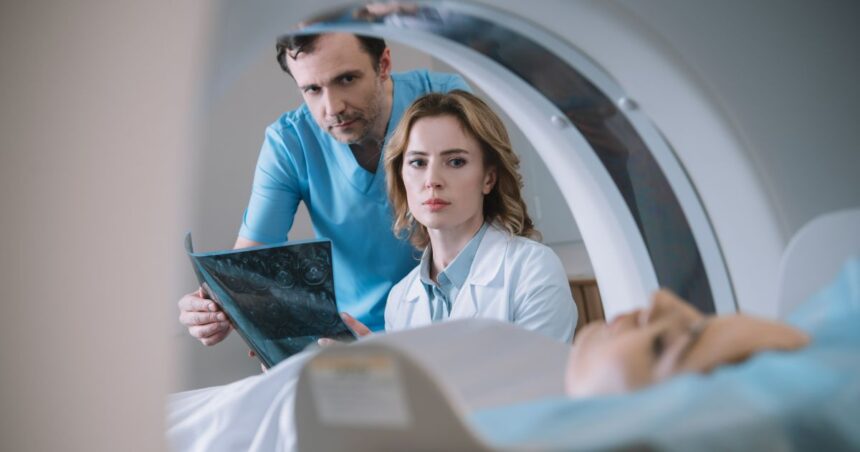Magnetic Resonance Imaging (MRI) has become an essential diagnostic tool in modern medicine, known for its ability to provide detailed images of internal structures without using ionizing radiation.
When it comes to vulnerable populations such as children and pregnant women, questions about its safety naturally arise. Let’s discuss the safety of MRI scans for these groups, examining current research and guidelines to provide a comprehensive understanding.
MRI Safety for Pregnant Women
MRI scans are generally considered safe for pregnant women. Over the past three decades, numerous studies have examined the effects of MRI exposure on unborn babies, finding no evidence of harm when the exams are conducted without contrast agents.
Unlike X-rays and CT scans, MRI does not use ionizing radiation, which is known to increase the risk of cancer and other health issues. This makes MRI a preferred imaging method during pregnancy for diagnosing various conditions.
First Trimester Concerns
The first trimester is a critical period in fetal development, and naturally, there is heightened caution regarding any medical interventions during this time. Although the safety of MRI during the first trimester has not been conclusively established, most studies have not shown any ill effects. Despite the lack of definitive evidence, many healthcare providers avoid MRI during the first trimester unless necessary, erring on the side of caution.
Gadolinium-Based Contrast Agents
One significant concern during pregnancy is using gadolinium-based contrast agents, sometimes used to enhance the clarity of MRI images. Studies have linked gadolinium exposure during pregnancy to potential risks such as rheumatological, inflammatory, or skin conditions in the newborn, as well as stillbirth or neonatal death.
Due to these risks, gadolinium is typically avoided during pregnancy unless the benefits outweigh the risks. When its use is deemed necessary, it requires careful consideration and informed consent from the patient.
Overview of MRI for Pregnant Women
MRI scans are considered safe for pregnant women, particularly when performed without contrast agents. The avoidance of ionizing radiation makes MRI a preferable option over other imaging techniques, especially during sensitive periods of pregnancy. Caution is advised during the first trimester, and using gadolinium contrast agents is generally avoided unless necessary.
MRI Safety for Children
MRI is also considered a safe imaging modality for children. One of the main advantages of MRI over other imaging techniques like X-rays and CT scans is that it does not involve ionizing radiation, which can be harmful, especially to growing children.
MRI’s ability to produce detailed images of soft tissues, organs, and other internal structures makes it a valuable diagnostic tool in pediatric medicine.
Anesthesia and Sedation
One aspect of MRI in children that requires special attention is the need for anesthesia or sedation. MRI scans can take a long time and require the patient to remain still, which can be challenging for young children.
Children, especially those under the age of five or those with certain medical conditions, may need to be sedated to obtain clear images. While anesthesia carries its risks, advancements in pediatric anesthesiology have made it safer than ever. The decision to use sedation is made carefully, weighing the benefits of the MRI against the risks associated with anesthesia.
Potential Risks and Considerations
While MRI is generally safe, there are some considerations and potential risks. For instance, the strong magnetic fields used in MRI can interact with metal objects in the body, such as pacemakers or cochlear implants. Healthcare providers must be aware of any implants or devices a child may have before conducting an MRI. Children with certain medical conditions may also require special considerations to ensure their safety during the scan.
Summary of MRI for Children
MRI scans are a valuable and generally safe diagnostic tool for children. They provide detailed images without the risks associated with ionizing radiation. The need for anesthesia or sedation and the presence of metal implants or devices require careful planning and consideration. With proper precautions, MRI can safely diagnose and monitor various conditions in pediatric patients.
The Bottom Line: MRI Safety for Children and Pregnant Women
Both pregnant women and children represent vulnerable populations that require special consideration when undergoing medical procedures, including MRI scans. The available evidence supports the safety of MRI for these groups, mainly when contrast agents are not used.
MRI provides a non-invasive, radiation-free way to obtain crucial medical information, making it a preferred choice in many situations.
Avoiding gadolinium-based contrast agents and exercising caution during the first trimester are essential safety measures for pregnant women. For children, the primary concerns involve the need for sedation and the presence of any metal implants.
By sticking to established guidelines and protocols, healthcare providers can minimize risks and ensure that MRI remains a safe and effective tool for diagnosing and managing health conditions in pregnant women and children.

